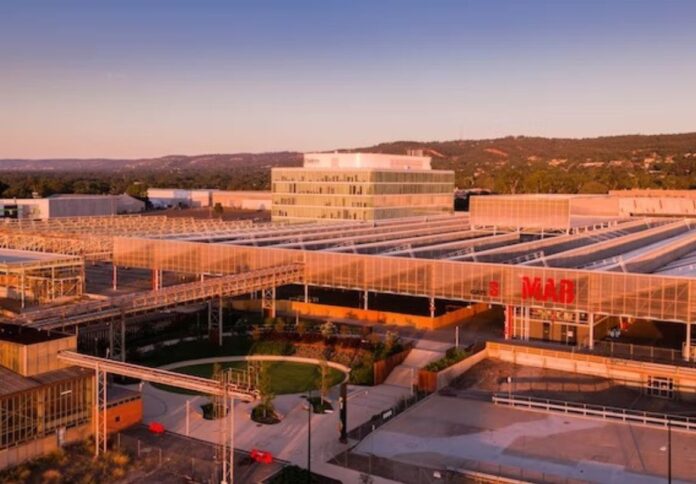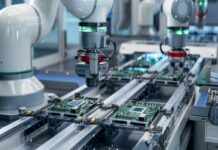
As it enters its second decade of operation, Tonsley Innovation District said it keeps a laser-focused dedication to fostering innovation and reviving the state’s economy.
Since its opening in 2012, Tonsley, a centre for cutting-edge research and development (R&D), has sped up Adelaide’s shift from low-value to high-value manufacturing and, along with it, expanded the state’s sovereign capability.
To date, Tonsley employs around 2,000 workers across 140 organisations. More than 500 people call Tonsley home as part of its expanding community, and 8,500 students study alongside this highly skilled and specialised workforce each year at major academic institutions Flinders University and TAFE SA.
The strategic selection of four focus sectors — cleantech and renewable energy; automation, software and simulation; mining and energy services — accounts for a significant portion of Tonsley’s competitive advantage and positioning as a global leader in innovation.
As the years went by, Tonsley has continued the development of robust trust-based networks and initiatives, which have sparked cooperative relationships, thus making Tonsley a catalyst for change and innovation.
Forging stronger relationships
Over the last decade, Tonsley has contributed to establishing national and international markets for locally made and developed items and technologies.
For one, the control panels used in self-service bag drop at Singapore’s Changi Airport are manufactured by SAGE Automation. Its technology handles the electronic lane change sequencing on the Sydney Harbour Bridge, aiding the traffic flow of around 160,000 cars each day, and its automation aids in the production of the cult Aussie biscuit, the Tim Tam.
Moreover, Micro-X’s lightweight x-ray machines are assisting doctors on the front lines of the Ukrainian conflict.
Zeiss created the well-known UV-Protect – a coating for optical lenses that provides sunglass-level protection.
The Factory of the Future, a collaboration between BAE Systems and Flinders University, serves as an advanced manufacturing test bed, utilising innovation, Industry 4.0 technology, research, and training to find methods to make Osborne the safest and most productive shipyard in the world.
The list could go on, demonstrating Tonsley’s remarkable achievement.
Setting long-term sustainability and exceptional infrastructure
Of Tonsley’s 61-hectare footprint, Renewal SA has so far unlocked 48.5 of them, including the award-winning Main Assembly Building’s (MAB,) which has raised the bar for nationally recognised sustainable urban redevelopment initiatives.
The MAB’s five-hectare outer shell, which was purposefully saved from its days as an assembly line, has been transformed into a captivating and open area dotted with lush urban trees, placemaking, amenities, and quick access to Adelaide’s rail network and greenways.
Moreover, up to 80 per cent of Tonsley’s current energy needs might be met by the 13,000 solar panels that have been installed on the MAB rooftop and are connected to a district-wide energy plan.
Tonsley has also facilitated the testing of autonomous buses, advancing sustainable transportation initiatives. The Tesla service and maintenance centre, which is in charge of maximising the potential of Tesla Powerwalls used in some of the biggest battery storage facilities in the world, has been warmly welcomed.
Additionally, it has shown its ongoing dedication to the environment by planting 42,513 plants and trees across the entire property.
Next steps for Tonsley’s growth and innovation
As Tonsley completed little over half of its 20-year master plan, the District said it will continue to expand dramatically over the following 10 years.
By the beginning of next year, Renewal SA hopes to complete its capital works programme, which includes the significant task of finishing the ring road around the MAB.
By 2028, three years before Tonsley celebrates its twentieth year, the final allotments outside of the MAB are scheduled for market sale.
Tonsley will soon have a 10-megawatt battery placed in the District, maintained by CleanPeak Energy, adding to its environmental credentials. The large-scale solar array on the MAB roof will generate excess energy, which the battery will capture, store, and release.
With the development of a new technical college that works with Flinders University, employment opportunities for students in Years 10 to 12 will become more obvious starting in 2025.
The state government will also continue to develop its desire for a strategic and coordinated approach to the management of South Australia’s innovation districts and economic zones over the course of the following 12 months, during which time a new long-term governance model for Tonsley will be created.
“The District has attracted a large number of innovators, businesses and students, and has been recognised as Australia’s most awarded Innovation District. Tonsley’s success is a testament to the power of sustainable urban regeneration projects that foster innovation and collaboration between industry, academia, and government,” Minister for Housing and Urban Development Nick Champion stated.



















